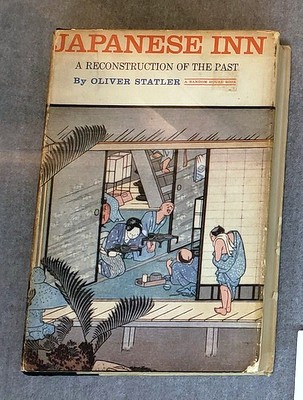Difference between revisions of "Japanese Inn"
| Line 1: | Line 1: | ||
| + | [[File:Japanese-inn.jpg|right|thumb|400px|A copy of ''Japanese Inn'' on display at the Minaguchiya Gallery]] | ||
*''Author: Oliver Statler'' | *''Author: Oliver Statler'' | ||
*''First Published: 1961, Random House'' | *''First Published: 1961, Random House'' | ||
| − | ''Japanese Inn'' by [[Oliver Statler]] | + | ''Japanese Inn'' by [[Oliver Statler]] is a popular history telling the history of Japan from 1550-1953 as seen through the eyes of the Mochizuki 望月 family, the owners of the Minaguchiya, a ''[[waki-honjin]]'' inn in the town of [[Okitsu]]<ref>Now part of Shimizu Ward, [[Shizuoka City]], in [[Shizuoka prefecture]].</ref>. The town, dominated by [[Seiken-ji|Seiken-ji temple]] 清見寺, lies a few miles east of [[Sunpu]] in [[Suruga province]] along the important [[Highways|Tokaido highway]]. The highway system and the inns that supported it were an important feature of the [[Edo Period]]. The book became a bestseller soon after its initial publication in 1961, and was published in Japanese translation that same year.<ref>Gallery labels, Minaguchiya Gallery, Okitsu.[https://www.flickr.com/photos/toranosuke/50110890931/in/photostream/]</ref> |
Seiken-ji regularly housed nobility and other elites who were passing through Okitsu. [[Tokugawa Ieyasu]] stayed there for a time during his childhood; [[Toyotomi Hideyoshi]] stayed there on the eve of the [[Siege of Odawara|siege of Odawara castle]], as did his tea master [[Sen no Rikyu|Sen no Rikyû]]. The shogun [[Tokugawa Iemochi]] on his way to Kyoto in [[1863]], and [[Meiji Emperor|Emperor Meiji]] on his way to the new capital of Tokyo also spent the night there, as did [[Korean embassies to Edo]]. | Seiken-ji regularly housed nobility and other elites who were passing through Okitsu. [[Tokugawa Ieyasu]] stayed there for a time during his childhood; [[Toyotomi Hideyoshi]] stayed there on the eve of the [[Siege of Odawara|siege of Odawara castle]], as did his tea master [[Sen no Rikyu|Sen no Rikyû]]. The shogun [[Tokugawa Iemochi]] on his way to Kyoto in [[1863]], and [[Meiji Emperor|Emperor Meiji]] on his way to the new capital of Tokyo also spent the night there, as did [[Korean embassies to Edo]]. | ||
Latest revision as of 20:40, 17 July 2020
- Author: Oliver Statler
- First Published: 1961, Random House
Japanese Inn by Oliver Statler is a popular history telling the history of Japan from 1550-1953 as seen through the eyes of the Mochizuki 望月 family, the owners of the Minaguchiya, a waki-honjin inn in the town of Okitsu[1]. The town, dominated by Seiken-ji temple 清見寺, lies a few miles east of Sunpu in Suruga province along the important Tokaido highway. The highway system and the inns that supported it were an important feature of the Edo Period. The book became a bestseller soon after its initial publication in 1961, and was published in Japanese translation that same year.[2]
Seiken-ji regularly housed nobility and other elites who were passing through Okitsu. Tokugawa Ieyasu stayed there for a time during his childhood; Toyotomi Hideyoshi stayed there on the eve of the siege of Odawara castle, as did his tea master Sen no Rikyû. The shogun Tokugawa Iemochi on his way to Kyoto in 1863, and Emperor Meiji on his way to the new capital of Tokyo also spent the night there, as did Korean embassies to Edo.
At the Minaguchi-ya itself, the Itô family (founders of the Matsuzakaya department store) were regular guests as early as 1691. Among other guests over the years were attendants of Kira Yoshinaka, Shimazu Hisamitsu of Satsuma han, who gave the inn permission to use the Shimazu crest, members of the entourage of genrô Saionji Kinmochi who had a close relationship with the Mochitsuki family, and the Shôwa Emperor (Hirohito). Numerous other samurai, daimyô, poets, artists, pilgrims, Dutch East India Company officers, and others of historical significance also stayed at the inn over the centuries.
The inn went out of business in 1985, and by spring of the next year was being used by a local corporation for the corporation's own private use. However, there is now a local history gallery open to the public on the grounds, run by the Verkehr Shimizu Port Museum.
References
- ↑ Now part of Shimizu Ward, Shizuoka City, in Shizuoka prefecture.
- ↑ Gallery labels, Minaguchiya Gallery, Okitsu.[1]
